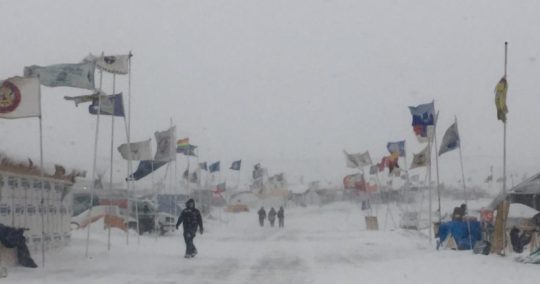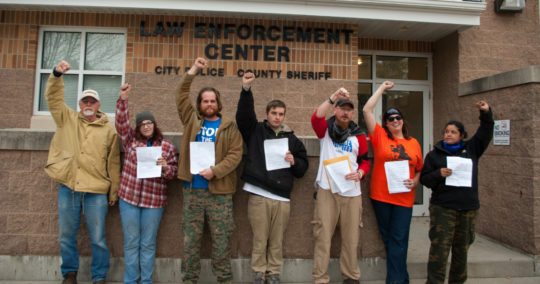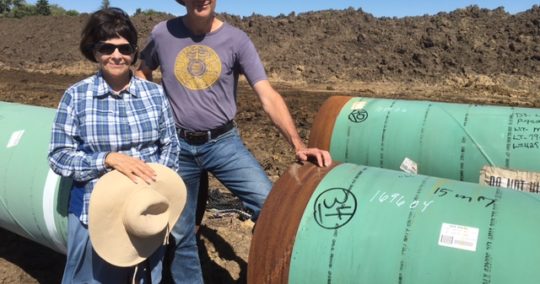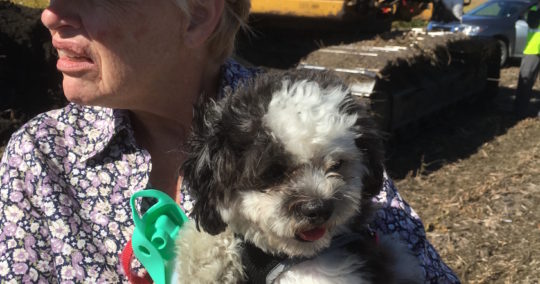FAQ: Climate Justice Unity March
Q: What does a typical day on the March look like?
A: Marchers wake-up around 7:00 a.m., eat breakfast, make their lunch, pack up camp and circle up for announcements at 8:30 a.m. Marchers then depart together by 9:00 a.m. Each day’s mileage is between 8 and 12 miles. There will be a break about every 3-4 miles to recharge, take a bathroom break and to have lunch or a snack. Upon getting to camp, marchers will set up their tents, relax, take care of any social media work they have to do. At 5:00 p.m. each day there will be a community forum that all marchers should plan to attend, followed by a community dinner and music.
Q: What will it cost me to march?
A: There is no cost to march. However, we do appreciate donations.
Q: What equipment will I need?
A: Please see our packing list for items we suggest. Limit is two large bags and one small backpack for day use. All camping gear, chairs and personal items must fit in these bags. No loose items, or anything breakable please. We recommend that ALL ITEMS have your name and contact info on it, and leave valuables at home.
Q: How will our equipment be transported?
A: We have a 20-foot gear truck donated by Joe Henry with LULAC that carries our gear and pulls a solar generator. We also have a pickup truck to haul the commodes. There will also be a sag wagon.
Q: What about food?
A: The march is purchasing food as it travels. We will have coolers and some dry goods storage. Marchers, staff and volunteers will be expected to provide their own mess kit and sign up to help prepare food in camp, unless provided by a local community or organization. While not guaranteed, we strive to address as many unique dietary restrictions and preferences as possible. We welcome groups offering to prepare a meal for us!
Q: How do I get to and from the march?
A: There will be a van and gear truck departing from near the State Capitol in Des Moines Friday afternoon April 21 (time and location TBD) to take marchers to the start of the march. Marchers who would like to reserve this spot please email Sarah Spain: sarah@climatemarch.org. Otherwise, it is requested that marchers arrange their own transportation to and from the march, although there likely will be people coming and going to the march who might be able to provide a ride either east or west. Please DO NOT PLAN TO LEAVE YOUR VEHICLE PARKED WHERE YOU START, OR ALONG THE MARCH ROUTE.
Q: Can marchers bring pets?
A: We encourage marchers not to bring any pets on the march, unless it is a registered service animal or some other special circumstance.
Q: Where will the marching community set up camp?
A: Marchers are camping at various locations contingent on available opportunities. Camping locations include public campgrounds, public parks, farm fields and private property. The complete list of campsites will be made available as soon as we have all the details nailed down.
Q: Is there electricity on the march?
A: Yes, the march has a solar generator that can power electrical equipment. Please have all electronics and charging cords labeled clearly with your personal information.
Q: What if I cannot march the entire mileage a certain day or days?
A: There will be opportunities to volunteer to drive the break truck that pulls commodes ahead every 3-4 miles, and there is a passenger seat also available in that vehicle. When available, there will be a sag wagon to pick up marchers that need to be picked up and brought to camp.
Q: Will marchers interact with the communities we pass through?
A: YES! This is perhaps the most important aspect of the march. The opportunities for interaction between marchers and host communities include learning from the people we will meet along the way and exchanging information about how climate change affects us, and about other pressing issues of importance to the constituency groups partnering with Bold to pull together the march. Each evening, there will be community forum, shared meal and live music.
Q: Can I march part-time?
A: Yes. Marchers are invited to march any duration they are able. While we strongly encourage people who can to participate in the entire march, if you are interested in participating for a day or two, please indicate on the application what days you will be attending so we have a count for food and camp needs. Please arrange to be picked up and dropped off at the appropriate locations.
Q: Where can I leave my car?
A: At home, preferably! We aim to have as few vehicles on the march as possible. Do not plan on bringing your car to the march and parking it at Little Creek Camp. There is very limited vehicle space there. For those marching the entire distance, or those just doing the first day or so of the march, there will be a van departing the Des Moines Capitol area Friday afternoon (time and location TBD) to Little Creek Camp. Email sarah@climatemarch.org to reserve a space. Otherwise, please arrange transportation to your arrival and departure locations.
Q: What volunteer support is needed?
A: We will have daily sign-up sheets for various opportunities to volunteer on the march, which include, but are not limited to:
● loading and unloading of vehicles (must be able to lift up to 30-50 lbs.)
● camp-scaping to leave each camp area as good or better than we found it
● driving a 20-foot gear truck ahead to next camp site; arrangements can be made to have you delivered back to camp if you want to march that day
● food prep, sanitation and clean up
● driving the truck that pulls the commodes and water for breaks while marching; we break every 3-4 miles so we can switch off drivers if needed
● speaking or performing music at our evening forums (contact ed@boldiowa.org if interested in speaking or playing music, and we’ll try to accommodate as many voices as possible)
HOST FAQs
Q: How many marchers will there be?
A: It is hard to give an exact number because we have people joining us along the way for all, or part of the march. We expect to have 25+ marchers for the entirety of the march, but as the march gets close to the Des Moines area, we expect those numbers to increase.
Q: What kind of accommodations are needed?
A: Our caravan is limited, but fairly self-sufficient with our own solar showers, solar generator, toilets, tent camping gear, etc. However we welcome local support of these daily needs. A level space for parking, and the space to set up around 15-30 tents for one night is essential. Two of our vehicles need semi-truck style parking, with pull through options. The tents can be set up close together, on as level ground as possible and ideally on a site not too close to traffic noise. Back-up option: Marchers may also sleep on a floor indoors with their mattress and sleeping bag.
Q: Besides basic needs: what are you hoping to accomplish on this march?
A: The Climate Justice Unity March will connect people from urban centers with rural residents to share stories and concerns regarding climate change and a range of other issues. With the polarization in our country, it is more important than ever that these opportunities to meet and talk happen. Our Latino, Black and Native allies are eager to share stories that may be unfamiliar to people in rural communities. Similarly, we want to give people in the towns we walk through a chance to share their stories, not just about how climate change is affecting them but stories about challenges facing farmers and others who live and work in rural Iowa.
Q: What do marchers like to eat?
A: Given the number of calories being burned by walking . . . A LOT! We welcome groups offering to prepare a meal for us! This is an ideal way to meet local people and make new friends along the way. Otherwise, we have a food budget and will be purchasing as much local food supplies as we can from these sources. Community kitchen facilities are also handy if near the route. Some marchers have special needs like vegetarian, vegan and gluten-free. If any of these types of foods are prepared and donated, it is important they are marked clearly.





